The Mediation Support Unit (MSU) in the Department of Political and Peacebuilding Affairs (DPPA) serves as the UN system-wide focal point on mediation expertise and support. The Unit, inter-alia, provides tailored operational support to peace and dialogue processes through expert staff from the Unit and the Standby Team of Senior Mediation Advisors (SBT).
What We Do
MSU’s core competencies include operational assistance with mediation and peace processes, targeted capacity building to partners, and developing mediation guidance, lessons learned, and best practices.
MSU staff, including in-house experts on ceasefires, constitution-making, and process design, are able to provide tailored support throughout the planning, implementation and evaluation phases of a mediation process. The Unit also manages the Standby Team of Senior Mediation Advisers (SBT), which can be mobilized as a complementary mediation support capacity.
The Unit organizes a series of flagship trainings, including the UN High Level Mediation Course, the Ceasefire Mediation Course and the Women in Ceasefire Negotiations Course. MSU furthermore develops and maintains guidance and resources for mediators. This includes a searchable database of peace agreements – allowing mediators to compare language across some 75,000+ provisions of 1,300 agreements. When requested, MSU also provides tailored guidance, often involving comparative case analysis, to field missions.
MSU partners frequently with various regional organizations. It is also a member of several mediation networks, including the Group of Friends on Mediation and the Mediation Support Network, and engages regularly with the Global Alliance of Regional Women Mediator Networks.
DPPA’s mediation support capacity relies predominantly on funding from the Multi-Year Appeal (MYA) – including to allow for on-the-ground support to peace discussions. Sustained funding will allow MSU to continue to deploy operational expert support where needed and to develop innovative approaches and mediation guidance in emerging fields such as digital technologies, climate, local and sub-national mediation, and the youth, peace and security agenda.
Global

Flexible

Fast

Innovative & Inclusive

Expanding Our Knowledge and Helping Others to Learn
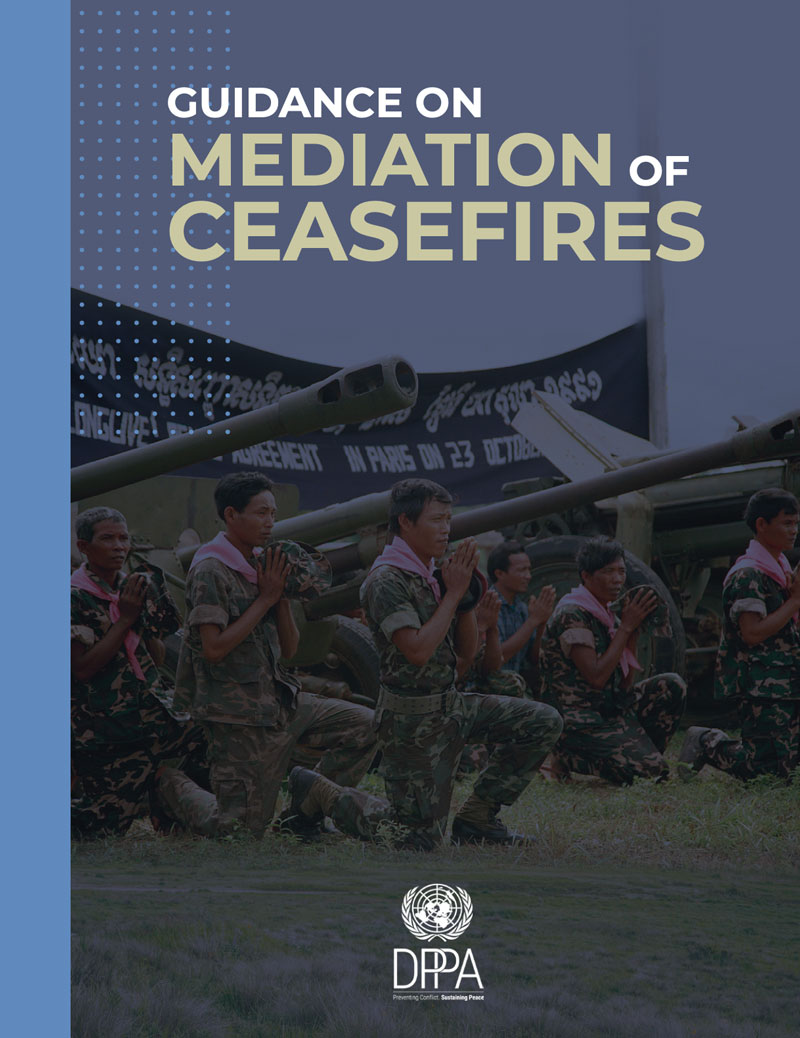
The Guidance is designed to support United Nations senior leader- ship and staff, mediators, and facilitators within and outside the UN, along with their teams, conflict parties, representatives of States and regional organizations, national and international non-governmental organizations, women’s groups and other stakeholders in peace processes.
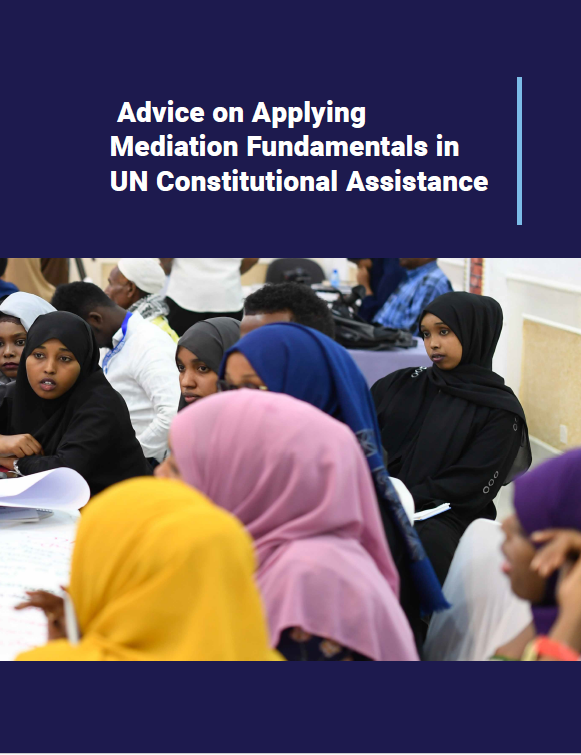
This paper captures key lessons learned in the author's two-year secondment to the Department of Political and Peacebuilding Affairs (DPPA) Policy and Mediation Division, Mediation Support Unit, during which the author supported constitution-making processes and provided advice on handling constitutional issues.
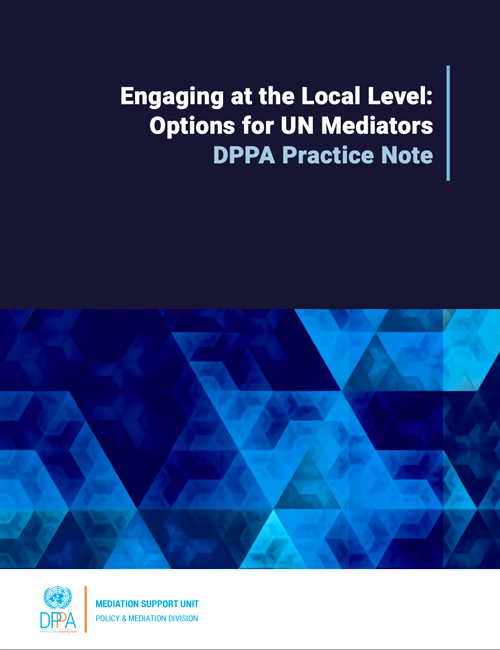
This Practice Note outlines circumstances under which more direct involvement with local conflicts and mediation processes might be strategically relevant for United Nations mediators working on national political processes.
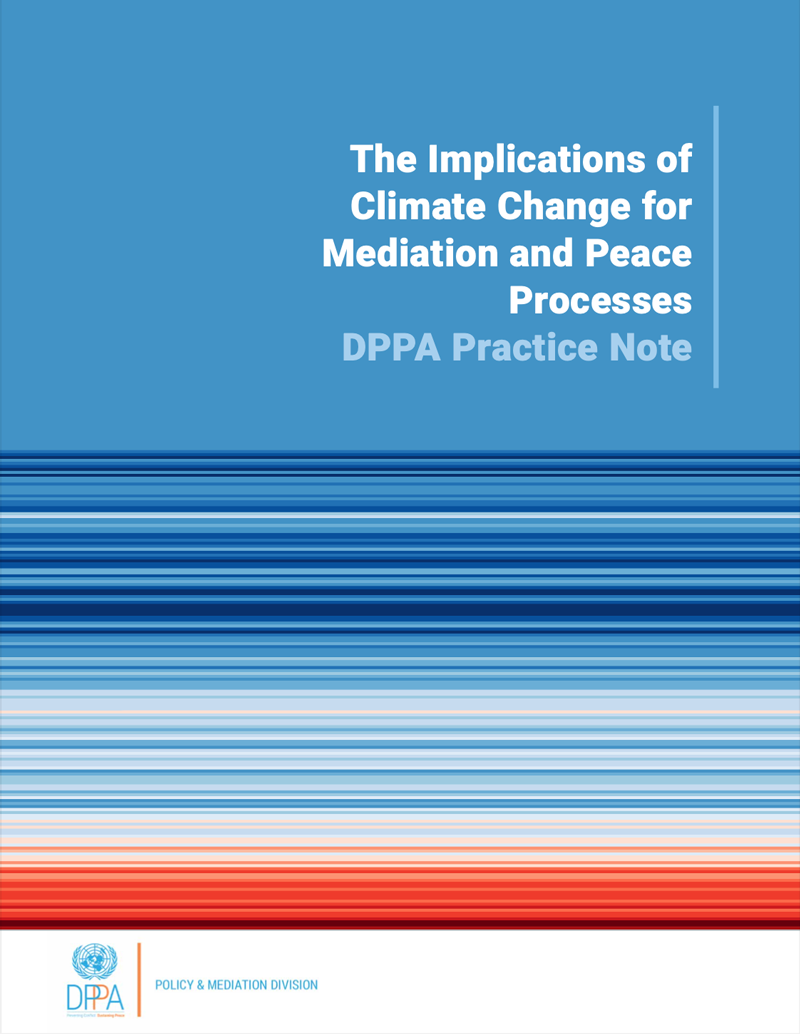
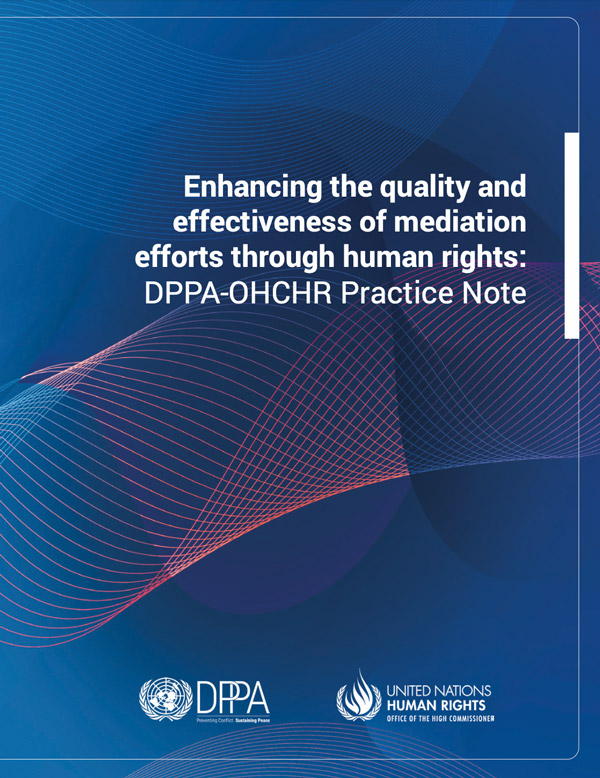
This practice note, a DPPA-OHCHR collaboration, delves into practical strategies and real-world examples to help mediators and human rights practitioners weave human rights principles and considerations into their work in general and in every step of mediation efforts specifically. The note shows that human rights offer practical solutions to many of the challenging issues that mediators try to address.
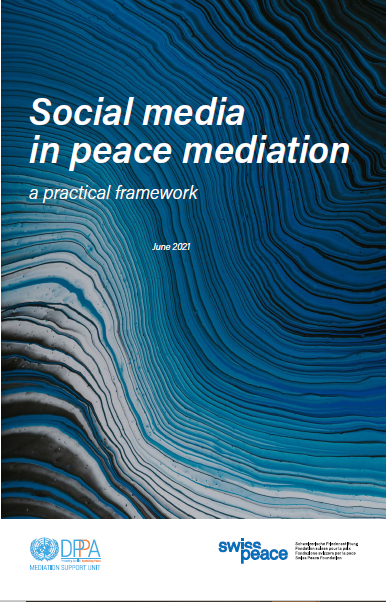
Produced jointly by DPPA Mediation Support Unit and swisspeace, this paper discusses the impact of social media on peace mediation, makes practical suggestions for mediators and their teams, and poses questions for further consideration and analysis. The paper also includes illustrative examples of practical social media uses.
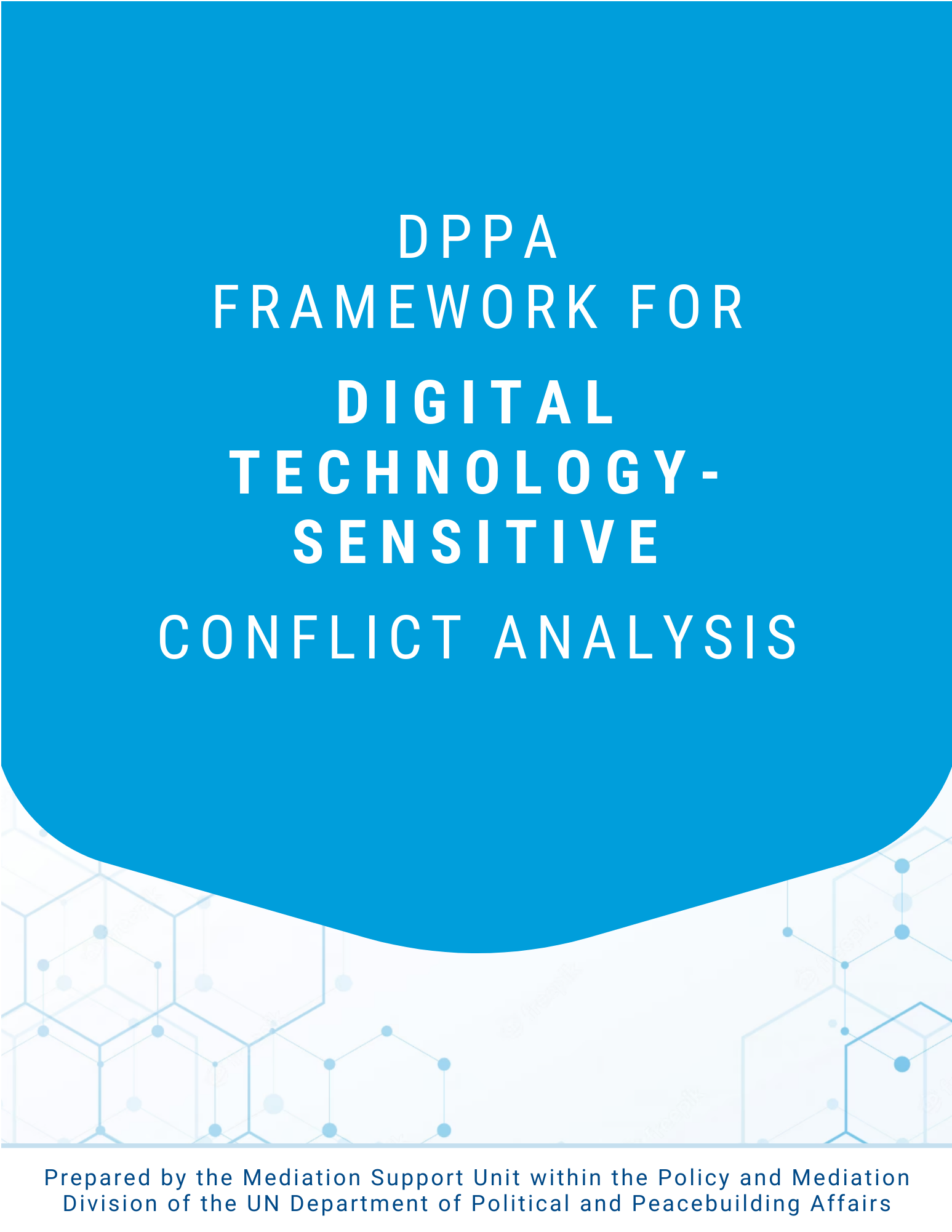
Digital technologies are also changing the character of conflict as parties increasingly rely on them to advance their objectives. Mediators and their teams need to consider additional factors such as the digital ecosystem of a given setting and how digital technologies and related data issues influence the power dynamics of a conflict. To address these new developments and help mediators and political affairs officers navigate the issues, the DPPA Policy and Mediation Division has prepared a Framework for Digital Technology-sensitive Conflict Analysis.
Visit the resources page for further guidance, policy and practice documents on mediation.
2024 Highlights

152 deployments of staff/advisors
upon request, for assistance in mediation

131 Standby Team mediation support assignments
in approximately 28 different contexts

Technical advice and support on gender and inclusion
provided to 100 per cent of all UN led and co-led peace processes
2024 Support by Theme
2024 Support by Region
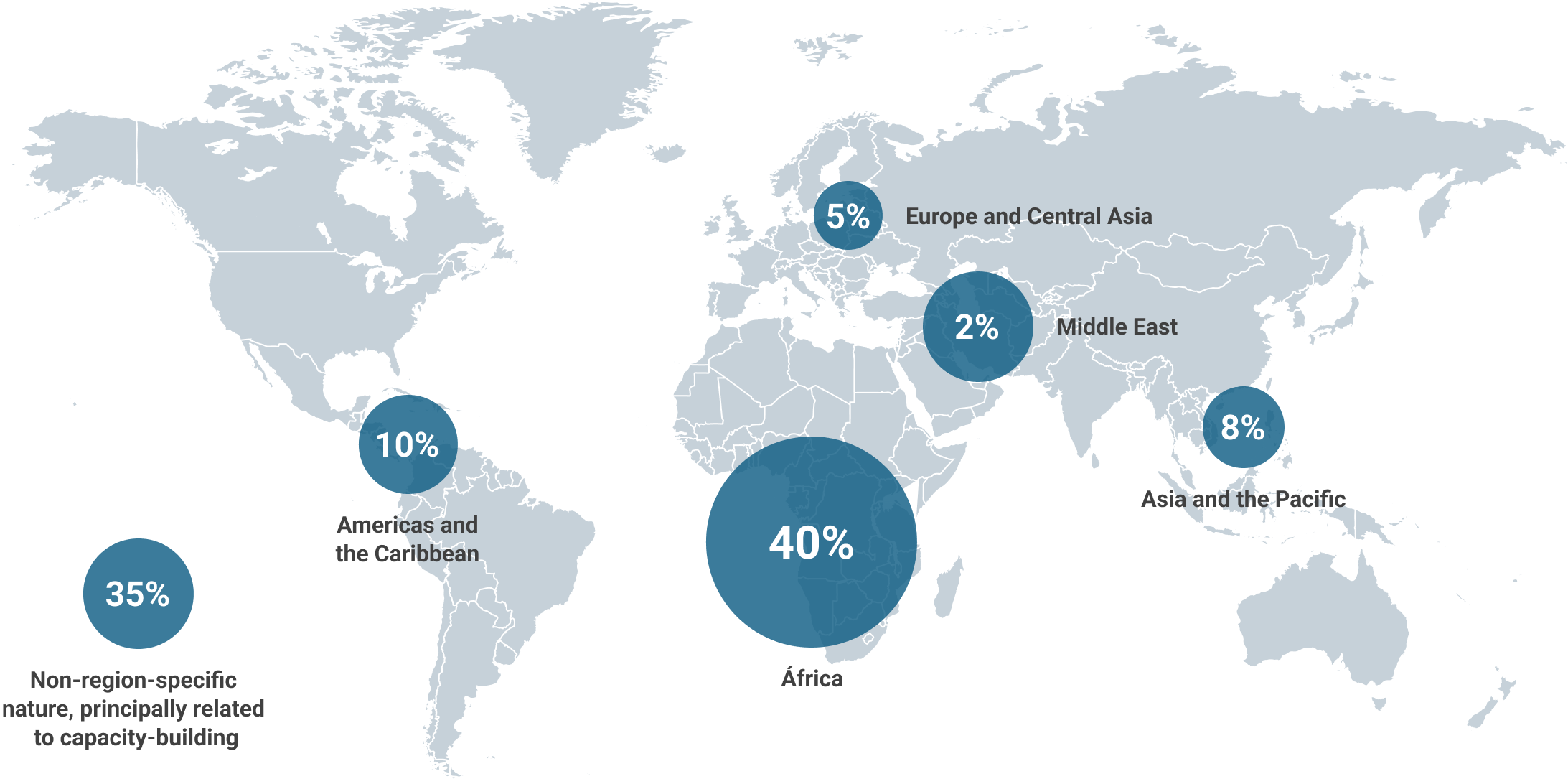

The Mediation Support Unit (MSU) in the Department of Political and Peacebuilding Affairs (DPPA) serves as the UN system-wide focal point on mediation expertise and support.
Snapshot of Current Activities
Updated on 14 April 2025
No activity during this period.
No activity during this period.
Syria
Since the change of government in Syria in December 2024, MSU, the Office of the Special Envoy for Syria, and the DPPA-DPO Middle East Division have maintained close contact to identify and respond to mediation support needs that may emerge, as the situation continues to rapidly evolve. Early in the current reporting period, MSU staff members and several Senior Mediation Advisors engaged OSE-Syria staff to discuss and prepare the OSE for topics and questions that were relevant to the new context and being contemplated by the caretaker authorities and the Syrians more broadly. Drawing from comparative global examples and good practices, MSU and SBT members with expertise on process design and constitutional issues further developed background papers for internal use by the OSE-Syria and MED on political transitions and national dialogues, constitutional processes, and security transitions.
Separately, at the request of the Acting Head of Mission of UN Disengagement Observer Force (UNDOF), MSUs senior advisor on ceasefires and security arrangements was deployed to UNDOF, Syria and Israel, from 26 January to 3 February 2025 to provide technical support and advise the Mission leadership on its engagement and de-escalation strategy on the Syrian-Israeli border in the Mission’s area of responsibility and in line with the 1974 Disengagement Agreement between Israel and Syria.
Yemen
MSU’s Senior Advisor on Ceasefires and Security Arrangements continued to provide remote technical advice and support to OSESG-Yemen. In addition, from 24 to 26 January 2025, he supported and led several sessions with the delegation of the Kingdom of Saudi Arabia to the Military Coordination Committee (MCC). The MCC was established pursuant to the 2022 temporary humanitarian truce.
The meeting followed a similar engagement with the Government of Yemen delegation in December 2024 and formed part of a series of engagements offered to the MCC delegations of the Government of Yemen, the Houthis and Saudi Arabia. Drawing from comparative global examples, the series provides opportunities to exchange views and experiences on key issues, such as different types of ceasefires, the planning process and ceasefire negotiations, monitoring and verification, and oversight mechanisms. These exchanges are intended to help preparation and planning for a sustainable ceasefire that addresses the needs and priorities of the Yemeni context, an important step towards achieving lasting peace and stability in the country.
African Union
An SBT member was deployed to provide input on gender and inclusion and process design in the substance and structure of the AU Mediation Support Handbook that serves as a reference and field guide for mediation teams and lead mediators on AU missions. Since the handbook was developed in 2014, many changes had taken place in the mediation landscape in Africa. The AU Commission has also undergone restructuring and transformed the Mediation Support Unit into a fully-fledged Mediation and Dialogue Division with a broader mandate. These changes required a thorough review of the handbook including updating its references to mediation experiences and cases across the continent of Africa. The expert drew on her experiences to inform the meeting on different strategies used to include women in peace processes and the transfer mechanisms used to link outcomes of different tracks to inform mediation processes/agreements. The discussions on the role of mediators in promoting inclusion using the UN’s targeted measures strategies were an example of good practice shared.
DRC
A MSU staff member participated in a “Global Investor and Business Roundtable: Addressing the Escalating Conflict in Eastern Democratic Republic of Congo” held in London on 18 March. The Roundtable was organized by the Anglican Communion and brought together over 20 investor, banking and corporate leaders, analysts and diplomats to reflect on ways the business community with interests in the DRC could support efforts towards peace. Participants stressed that the conflict is fueled in part by an increase in demand for natural resources globally, especially the copper boom that started in 2002. The MSU staff member delivered a presentation on the diplomatic efforts to address the conflict. He underlined that, in addition to its good offices roles, the United Nations had capacity to mobilize and sustain diplomatic support for ongoing regional initiatives.
Guinea
Following a request received from the Transitional National Council (TNC), the Resident Coordinator’s Office in Guinea requested the deployment of a Standby Team process design expert, supported remotely by a Constitutional Issues expert mobilized through the SBT mechanism. The purpose of the deployment was to provide comparative analysis and technical advice to an expert panel appointed by the TNC to review the country’s draft constitution.
Libya
MSU continued to support UNSMIL in implementing its comprehensive mandate, particularly with respect to mediation process design and ceasefires. In January 2025, building on his prior work, an SBT expert participated in several online calls and helped UNMSIL finalize their draft strategy for a multi-track political dialogue process, as well as related operationalization papers and documents to support the inaugural meeting of the Advisory Committee held on 9 February 2025.
The Advisory Committee is part of the inclusive and intra-Libyan political process to overcome the current political deadlock in Libya that UNSMIL announced to the Security Council in December 2024. Its role is to produce technically sound and politically viable proposals for resolving outstanding contentious issues in the electoral framework so as to enable the holding of elections. The SBT expert also advised the Mission on options for designing a broader national dialogue process.
South Sudan
MSU continued to support UNMISS in its mandated activities, including implementation of the Revitalized Agreement on the Resolution of the Conflict in South Sudan. In January 2025, an SBT process design expert finalized her report analyzing local peace agreements in South Sudan that have been facilitated and supported by the Mission. The overall aim of the review was to deepen understanding of the factors influencing the success or failure of local peace agreements in South Sudan. In February and March, the expert presented the main findings and recommendations of her study to the Mission’s leadership, UNMISS Civil Affairs staff working on the ground and the DPPA-DPO South Sudan IOT. Her final report offers guidance to the Mission for enhancing its capacity to implement sustainable peace agreements which could contribute to long-term peace and stability in the country.
Sudan
In January, MSU and SBT continued to provide process design support to the Office of the Personal Envoy for Sudan in relation to a series of online consultations with Sudanese stakeholders. An expert on Digital Technologies mobilized through the SBT mechanism advised on the facilitation of online meetings with Sudanese civil society representatives including youth, women, and other civic groups with a view to maximizing interactive engagement in the process. The MSU advisor on ceasefires and security arrangements also participated in the online consultations and briefed on the status of the ‘Jeddah Declaration of the Commitment to Protect Civilians’. During his visit to UNHQ on 26 February to brief the Security Council in closed consultations, PESG Lamamra said in an interview that views expressed by Sudanese civil society in these online meetings had informed a list of recommendations regarding the protection of civilians that he had officially submitted to the leadership of the two conflict parties.
Throughout the reporting period, MSU staff also continued their direct support to the Office of the Personal Envoy’s strategy sessions focused on his engagement with the conflict parties and multilateral organizations.
Afghanistan
MSU continued to support the DPPA-DPO Asia and Pacific Division and UNAMA on process design questions and planning for ways forward to advance international engagement on Afghanistan in a more coherent, coordinated, and structured manner by providing input and advice on internal options papers and background documents regarding a political pathway through which the interests of all sides—the Afghan people, the international community, and the de facto authorities-could be discussed. Separately, MSU also engaged with the UNAMA Climate Peace and Security Advisor on process design questions relating to climate and environment-related engagements.
MSU also worked with PMD’s Innovation Cell to support digital engagements carried out by UNAMA and UN Women in Afghanistan. This initiative aimed to enhance UNAMA’s understanding of the challenges and opportunities faced by Afghan businesspeople and to amplify their voices. The dialogue mainly targeted micro and small business owners, including female business owners, from various regions and provinces. The AI-powered platform used for the consultation included Dari and Pashto translation, enabling broader outreach across the country. The consultation engaged 165 participants; more than 60 per cent of participants were women.
Papua New Guinea
MSU continued to provide technical advice on the ongoing post-referendum consultation process between the Government of Papua New Guinea and the Autonomous Bougainville Government at the request of the DPPA-DPO Asia and Pacific Division (APD) and the Office of the Resident Coordinator. In January, an SBT process design expert provided technical expertise to the independent moderator on his workplan and the design of an inclusive consultation process. That same month, two SBT experts participated in discussions with APD to explore further ways of supporting the work of the moderator and to enable women and civil society to play a meaningful role in the peace process.
SBT and staff online and in person engagements (webinars, panels, consultations)
During the first quarter, multiple experts from the SBT mechanism and MSU staff participated in different virtual discussion formats as panelists, speakers, and moderators. They also acted as expert facilitators in various capacity building exercises for the UN and its partners including: An online lecture by the SBT security arrangements expert on ceasefire mediation, delivered for students of the Masters Course at the Institut Barcelona Estudis Internacionals (IBEI); a briefing to the United Nations CyberHub on MSU’s recent Practice Note on Mediation and the Malicious Uses of ICTs, an online discussion in January with the DCO Network of Economists on economic issues in peace processes, an SBT member providing capacity building to German Diplomats at the German Federal Foreign Office’s Training Academy in January, and an SBT expert on gender and inclusion participating on a panel on women’s participation in constitution-making processes at CSW side-event in March.
2025 SBT Induction and Retreat
From 3 to 7 February, the 2025 Standby Team of Senior Mediation Advisers (SBT) gathered at UN HQ to report for duty and to participate in an on-site retreat. Outgoing members of the 2024 Standby Team also joined. The Team held dedicated discussions exploring thematic topics related to mediation, including the Pact for the Future, support to national prevention initiatives, political roadmaps, gender-sensitive multitrack processes and addressing the malicious use of ICTs in mediation processes. The SBT also met with USG DiCarlo and held more than 20 bilateral meetings with DPPA-DPO regional divisions, desks and thematic offices in relation to emerging or ongoing mediation support requests.
Digital Technologies and Mediation
MSU continued to respond to requests for operational support on the design of digital engagements by United Nations field missions between January and March, including in the contexts of Afghanistan and Sudan as detailed above.
During the past quarter, MSU conducted outreach around its Practice Note on “Addressing the Malicious Use of Infomation and Communications Technologies in Mediation Processes” that was published in December 2024. The Note discusses the types of malicious use of ICTs in contemporary conflict, notably cyber operations and Internet and telecommunications shutdowns, and related implications for mediators. MSU presented the Practice Note to the full Standby Team on 5 February, the United Nations CyberHub that is chaired by the Office of Disarmament Affairs on 25 February, and to the CyberMediation Network at its quarterly online meeting on 6 March.
MSU also continued to coordinate the work of the CyberMediation Network, including organizing and facilitating this particular quarterly meeting.
Group of Friends of Mediation
On 19 March, the Group of Friends of Mediation convened an experts-level meeting to discuss cooperation with regional organizations; about 30 delegations attended, including representatives from Members States and regional organizations. MSU delivered the keynote address which focused on how it supports regional and sub-regional organizations, in terms of providing mediation technical expertise and target trainings to build their capacities. MSU also stressed that these efforts were in support of the UN Secretary-General’s Pact of the Future which called for greater cooperation between the UN and such organizations. At the meeting, short interventions were also made by the European Union, Malaysia (on behalf of ASEAN) and Finland (on behalf of the OSCE).
Peacemaker
During the reporting period, MSU launched the French, Russian, and Spanish versions of the Peacemaker website to comply with UN multilingualism requirements. MSU continues to develop the Arabic and Chinese versions of Peacemaker and aims to launch them in Q2 2025. The UN Peacemaker website is managed by MSU and is intended to connect peacemaking professionals with PMD’s resources, including a database of peace agreements, guidance materials, and information on accessing PMD's mediation support services.
